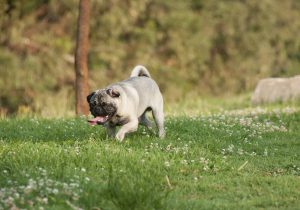What You Need to Know About Canine Parvovirus
 Canine parvovirus, also known as parvo, is a highly contagious illness that can be passed to any dog, particularly unvaccinated dogs and puppies under 4 months old. Is your dog protected? It’s a serious matter as parvovirus affects the gastrointestinal tract and, if left untreated, can cause death within 48 to 72 hours.
Canine parvovirus, also known as parvo, is a highly contagious illness that can be passed to any dog, particularly unvaccinated dogs and puppies under 4 months old. Is your dog protected? It’s a serious matter as parvovirus affects the gastrointestinal tract and, if left untreated, can cause death within 48 to 72 hours.
Be sure that you have all of the information you need to protect your dog from canine parvovirus. When it comes to parvo and your dog, it’s essential to understand what parvo is, how it is spread, and how to protect your pet.
Symptoms of Canine Parvovirus
Canine parvovirus attacks the white blood cells, rendering the body unable to combat the virus effectively. It also invades the cells in the intestine, leading to severe gastrointestinal distress for the infected dog. Severe vomiting and diarrhea associated with the disease leads to dehydration and eventual shock, as the damaged intestines may be unable to keep bacteria and other toxins from leaking into the bloodstream.
Parvovirus is an extremely serious illness. Call your veterinarian immediately if your dog is exhibiting the symptoms of parvo:
- Lethargy
- Loss of appetite
- Bloating
- Abdominal pain
- Vomiting
- Severe, often bloody, diarrhea
How is Parvo Treated?
There is no specific drug on the market to treat parvo, but an animal’s chances of survival increase with early, aggressive, supportive therapy. Treating a dog for parvo is often a long and expensive process. Young puppies are highly vulnerable, while older animals and those who have been at least partially vaccinated often have better outcomes.
Protecting Your Dog from Parvo
Parvo is a hardy virus that is spread via the stool and vomit of infected animals. Anywhere a sick dog has been has the potential to be contaminated with the virus, which can survive in soil for up to a year.
Fortunately, parvovirus is almost entirely preventable. Having your dog or puppy vaccinated against the disease is the most effective way to avoid this devastating illness. If you aren’t sure if your dog’s parvo vaccination is current, call your veterinarian right away.
Other ways to help stop the spread of parvo include:
- Keep puppies 5 months of age or younger away from potentially contaminated areas (dog parks, kennels, pet stores, etc.).
- Don’t let puppies or adult dogs investigate the fecal matter of other dogs. Dispose of any fecal matter you find promptly to limit the potential spread of disease.
- Don’t take sick dogs or dogs who may have been exposed to the illness to dog parks, kennels, or any area where they may come into contact with other dogs.
- Wash your hands and change your clothes soon after handling a dog that is sick or may have been exposed to parvo.
The staff members at OVRS care deeply about all pets and we know what a tough fight it can be to battle parvovirus. That’s why we urge you to contact your veterinarian to learn more about your puppy or adult dog’s wellness care and vaccination schedule.


